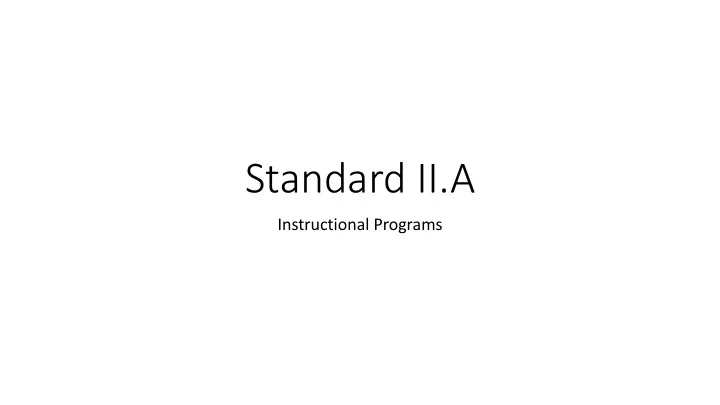

Standard II.A Instructional Programs
II.A: Instructional Programs • How do we make sure our college-level courses and programs have the quality and rigor of college-level coursework? • How do we measure the educational quality of our courses and programs? • How do we make sure we give our students a General Education package with a sufficient breadth of knowledge and that promotes intellectual inquiry?
II.A: Instructional Programs • Standard #1: All our instructional programs fit BC’s mission, are college- level and lead to students attaining specified learning outcomes. • Standard #2: All faculty ensure that the “what” and “how” of their teaching meets BC’s standards and expectations and are continuously improving. • Standard #3: All courses have SLOs and all programs have PLOs and we assess them all regularly. SLOs are on the COR and stated in the syllabus. • Standard #4: We distinguish our pre-collegiate courses from the collegiate courses and the pre-collegiate courses prepare students for college-level work.
II.A: Instructional Programs • Standard #5: Our programs really are college-level, follow established national norms, and have the appropriate unit amounts (Associate: ≥ 60 units and Baccalaureate: ≥ 120 units). • Standard #6: We schedule our classes so that students can complete their program in a reasonable time. • Standard #7: We effectively use a variety of delivery modes, teaching methods, and assessment methods to match our students needs. • Standard #8: We have valid course and program pre-requisites and placement methods and unbiased exams and assessment tools. • Standard #9: Course credit and program completion are based on the SLOs and PLOs. Units earned meet national norms and Federal requirements.
II.A: Instructional Programs • Standard #10: We clearly communicate our transfer policies, we accept transfer courses if they meet our SLOs, and we make sure our students can transfer on to other schools if appropriate. • Standard #11: All programs will include learning outcomes in: communication competency, information competency, quantitative competency, analytic inquiry skills, ethical reasoning, the ability to engage diverse perspectives, and program-specific learning outcomes. • Standard #12: We have a carefully considered philosophy of GenEd and criteria for including courses in our GenEd based on the GELOs and course SLOs. The GELOs prepare a student: to participate in civil society responsibly, to learn how to learn, and have broad content knowledge in the arts and humanities, sciences, mathematics, and social sciences. • Standard #13: All degree programs focus on a particular area and the courses in degree programs meet the PLOs and provide mastery of key theories and practices in that particular area.
II.A: Instructional Programs • Standard #14: Students getting CTE certificates and degrees have the skills needed to be employed in their program’s subject area and pass the licensure exams. • Standard #15: When programs are eliminated or significantly change, we make sure already enrolled students can complete their program in a timely manner without disruption. • Standard #16: We regularly evaluate and improve ALL instructional areas. BC is striving to improve all of our courses and programs to enhance learning outcomes and student achievement.
Standard II.B Library and Learning Support Services
II.B: Library and Learning Support Services • What makes a good library or other academic support service? how do we make sure it provides what our students need? • How do we make sure the library and other academic support services provide what our students need?
II.B: Library and Learning Support Services • Standard #1: We have a great library and other academic support services (tutoring, learning centers, computer labs, other technology, etc.) of sufficient quality and variety to meet the needs of all our students. • Standard #2: Faculty, including librarians, and learning support professionals decide what equipment and materials we need to make sure learning happens. • Standard #3: The library and other academic support services are assessed as to how well they help students meet BC’s learning outcomes. The assessments lead to improvements in those services. • Standard #4: We document the formal agreements we have with external libraries and academic support services and we ensure these external resources help us meet our mission, are effective, and students can easily use them.
Recommend
More recommend